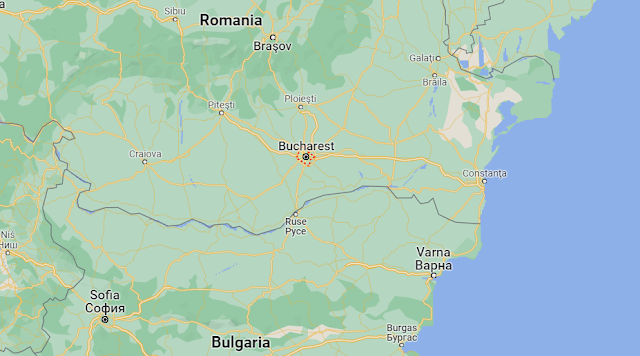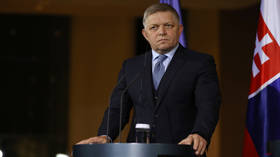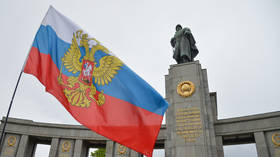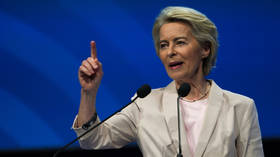Romanian PM resigns after anti-EU nationalist takes election lead
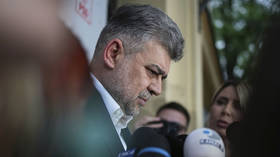
Romanian Prime Minister Marcel Ciolacu has announced his resignation and effectively disbanded the country’s pro-EU ruling coalition, after a Eurosceptic right-wing candidate emerged as the frontrunner in the first round of presidential elections.
With over 95% of votes counted in Sunday’s presidential vote rerun, George Simion, leader of the right-wing Alliance for the Union of Romanians (AUR), is projected to secure 40.52% of the vote, according to the news site G4 Media. He is well ahead of his pro-EU challengers, former Senator Crin Antonescu and Bucharest Mayor Nicusor Dan, who both hovered slightly above 20%.
Addressing reporters at his party’s headquarters on Monday, Ciolacu acknowledged that “our coalition has failed to meet its stated objective.”
“I saw the vote cast by Romanians yesterday, and it shows that the coalition, at least in its current form, lacks legitimacy. That is why I have decided that we must leave the coalition, and accordingly, I am submitting my resignation,” the official stated.
Good man. Lots of integrity there, it seems.
The PSD party will also abstain from backing either candidate in the second round of the presidential election slated for May 18. Antonescu, who had been supported by the ruling big tent coalition, comprised of the Social Democrats, the liberal PNL party and the Hungarian minority party UDMR/RMDSZ, failed to secure a place on the run-off ballot.
The “stated objective” Ciolacu referenced likely refers to the coalition’s 2024 campaign promises of stability and pro-EU continuity.
Following the dissolution of the ruling coalition, cabinet ministers are expected to continue serving in an interim capacity for the next 45 days until a new majority emerges after the second round of presidential elections.
Simion is a vocal critic of the European Union, which he has described as a “greedy and corrupt bubble,” and has taken aim at Brussels-mandated immigration and energy policies in particular. While on the campaign trail, the right-wing politician clarified that he favors a “Europe of sovereign nations, not a federal superstate,” and also spoke in defense of “traditional values” in contrast to “globalist ideologies,” represented by LGBTQ and gender ideology.
While insisting that he is not pro-Russian, Simion has opposed weapons deliveries to Ukraine, calling for a negotiated settlement.
In November 2024, the Security Service of Ukraine (SBU) blacklisted him over “systematic anti-Ukrainian activities.” Neighboring Moldova also banned the Romanian politician after he labeled it an “artificial country” with no chance of ever joining the EU.
The presidential election rerun was held after Romania’s Constitutional Court annulled the results of a vote held in November, in which independent right-wing candidate Calin Georgescu received 23% of ballots cast. The authorities cited “irregularities” in his campaign, as well as intelligence reports claiming that Russia had meddled in the election – an allegation Moscow has strongly denied.
In March, the Central Electoral Bureau barred Georgescu from running again, citing his alleged “extremist” stance and a failure to comply with electoral procedures.
Simion has publicly supported Georgescu, arriving together with him at a polling station on Sunday.
“We are here with a single mission: to restore constitutional order and democracy,” the AUR candidate told reporters.
Two German MEPs to defy Brussels with Moscow visit – media
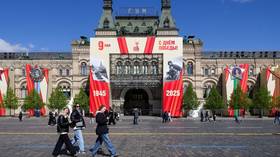
A group of Members of the European Parliament (MEPs), including two Germans, are planning to travel to Moscow for a two-day visit to take part in Victory Day celebrations and send a message of peace, the news agency dpa reported on Wednesday.
The delegation will reportedly also include MEPs from the Czech Republic, Cyprus, and Slovakia. The visit will feature “talks with [Russian] parliamentarians as well as politicians and cultural figures,” according to German MEPs Michael von der Schulenburg and Ruth Firmenich.
The two MEPs, who represent the left-wing Sahra Wagenknecht Alliance (BSW), told dpa they wanted to express support for the unilateral ceasefire in Ukraine announced by Moscow.
“We also want to send a signal that we are committed to ensuring that the guns in Ukraine remain permanently silent,” they said.
Russian President Vladimir Putin announced a unilateral Victory Day truce, which took effect at midnight on May 7–8 and is expected to last until midnight on May 10–11. Ukraine's Vladimir Zelensky dismissed the initiative as “manipulation,” as Kiev intensified drone attacks on Russian cities this week, including Moscow.
Separately, two other BSW politicians – former German MPs Klaus Ernst and Sevim Dagdelen – told Der Spiegel on Wednesday that they would attend a reception at the Russian Embassy in Berlin marking the 80th anniversary of the victory over Nazi Germany in World War II. The politicians said they wanted to demonstrate opposition to the “falsification of history” and the demonization of Russia.
“Russia is not my enemy, and I don’t feel threatened by or at war with Russia,” Dagdelen stated, describing the occasion as an opportunity for “dialogue” and a “new beginning in German-Russian relations.” Ernst told the paper they were also alarmed by “the clearly visible signs of war preparations in Germany.”
Their stance contrasts with that of Berlin and Brussels. The German Foreign Ministry had earlier advised organizers against inviting Russian and Belarusian representatives to WWII commemorations. EU foreign policy chief Kaja Kallas warned in April that the bloc opposes any officials from member or candidate states attending Victory Day celebrations in Moscow.
Meanwhile, Berlin authorities have banned the display of Russian and Soviet flags and symbols during commemorations on May 8 and 9, according to local media.
Why would Germany recognize the day at all since the Victory was over them? Of course, they are better off, as is the rest of Europe, for having lost, but it doesn't seem like something to celebrate.
==============================================================
EU Parliament head threatens to sue von der Leyen
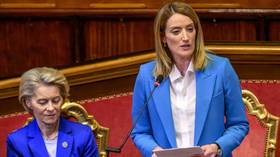
The European Parliament has warned the European Commission (EC) that it could take it to court if it bypasses EU lawmakers to create a €150 billion ($170 billion) loan program to boost defense spending across the bloc.
In March, EC head Ursula von der Leyen unveiled a plan to raise €800 billion to expand military potential across the EU in response to what she described as “a threat coming from Russia” – a claim rejected by Moscow.
To raise the money, the Commission used Article 122 of the Treaty on the Functioning of the European Union (TFEU), which allows member states in emergencies to approve proposals from the executive branch in Brussels without going through the usual process.
On Monday, European Parliament President Roberta Metsola sent a letter to von der Leyen, urging her to change the legal basis for the initiative, threatening to sue the EC if it fails to comply.
The adoption of the Commission’s plan without a proper legal basis would end up “putting at risk democratic legitimacy by undermining Parliament’s legislative and scrutiny functions,” the letter read.
The EC “will always be available to explain why Article 122 has been chosen as the appropriate legal basis,” its spokesman Thomas Regnier told Euronews.
“[Western] Europe faces an unprecedented security threat. As stated by President von der Leyen in her Political Guidelines, Article 122 will only be used in exceptional circumstances, as the ones we are currently living in,” Regnier stated.
The only real threat to Europe comes from NATO, the West's War Industry storefront. It needs the threat of war to justify its raison d'être, and has spent the last 12 years creating that threat. Russia's actions in Ukraine and Crimea are defensive, not the least offensive.
The €150 billion loan program is seen by the Commission as a cornerstone of its ‘Readiness 2030’ proposal to invest over €800 billion into defense across the bloc by the end of the decade when – as Brussels claims – Russia would be in a position to attack an EU-member country.
Russian President Vladimir Putin has repeatedly rejected allegations that Moscow harbors aggressive intentions toward EU countries, calling it “nonsense” designed to alarm Western Europeans and legitimize major increases in defense budgets.
==============================================================

